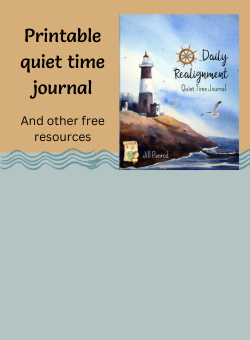
A New Quiet Time Plan
I’ve always been hit or miss with daily quiet time routines. As an anxious person, I believe heart and soul that the closer I get to God in prayer and study, the calmer my spirit will be. And yet… I’m hit or miss.
Recently I read a few books and articles on quiet time, and I decided to get serious. To do that, I needed to find a style of quiet time that worked for me. I didn’t, so I pieced together a bunch of ideas and came up with my own thing, and I’m sharing it here. Maybe this will work for you, or maybe it will be a total failure. But if it fails, try to figure out why, and then use that to make your own plan.
After I explain what I do, I give you the opportunity to download a journal that goes with this study. That’s free. I also link you to a pre-made journal I uploaded to Amazon, because some of you, like me, aren’t much for printing. That isn’t free, but it’s about as cheap as I can make it.
I call this method the Daily Realignment.
This isn’t a fancy idea. I don’t even know why it works, except I do use the journal, and it gives me little boxes to fill in, and for some reason that helps. Anyway, here is it, my personal method of spending time with God and His Bible every morning.
Four Simple Steps
Every day, I follow four simple steps:
- Step One: Start with Silence
- Step Two: Cast your Cares
- Step Three: Listen…
- Step Four: Praise the Lord, O My Soul
Silence
This step comes from Habakkuk 2:20 But the Lord is in His holy temple. Let all the earth keep silence before Him.
My church starts every worship with a minute or so of silence. Y’all, silence in 21st century life is hard! Settling the mind, quieting the soul… This is so contrary to the cultural norm where we crave input 24/7. My brain isn’t sure what to do with silence, and I sure don’t find myself naturally using it to focus on God. But I’ve found a few things that work for me.
Some methods of finding quiet for the soul include reading Psalms, writing simple words, poems, or sentences about peace and calm, dwelling on God as a refuge or a fortress or a rock, or verses about silence and stillness and calm and peace. You can write Scripture or write something new. Or just pray over these things.
Perhaps you need to close your eyes and listen to actual silence around you. Perhaps you need to walk somewhere quiet, like on a quiet road or a park or your back yard. I start this process in my back yard while I let out the dogs, when the world around me is quiet. Do what it takes to start your time with God with a settled, quiet spirit.
Cast Your Cares
This is from Psalm 55:22: Cast your cares on the Lord and he will sustain you; he will never let the righteous be shaken and 1 Peter 5:7: Cast all your anxiety on him because he cares for you.
What are your concerns today? About what are you fretting or fearful? What sins weigh you down? What seems too big or overwhelming to handle? This is time for confession and true disclosure of what’s going on in your heart, whatever might keep you from drawing close to God. If you wish to read Scripture here, use Psalms of lament. (Try 3, 6, 13, 25, 28, 31, 44, 56, 71, 77, 86, 142). Cast your cares on God by putting them on paper or in prayers, and release them into His hands for good.
For me, this gets some of the mental clutter out of the way so I can focus on the next part, feeding on the Word. It’s prayer, but I pray with my pen, so I now write it all out, where I used to pray internally. (My mind wanders in a way my pen never does). I read back through every now and then and find that some things have been resolved, while some prayers and concerns have been with me for a very long time. But I will keep dropping them at God’s feet until God lets me know to do otherwise.

Listen…
This comes from the mount of Transfiguration, when God speaks from a cloud and says of Jesus: This is my Son, whom I love; with him I am well pleased. Listen to him! (Matthew 17:5). This is the heart of realignment, reading the Word of God. You don’t have to limit yourself to words of Jesus, but if you aren’t familiar with the Bible, start with the Gospels and the Psalms. Look up Bible reading plans on the internet if you need a plan. After reading, write anything that catches your attention—new insights into God’s character, new insights into your own heart, things to do, questions to ask.
Remember, the point of this isn’t to check off quiet time in your to-do list. We are realigning. Our souls and hearts and minds are growing more like Jesus’, and that takes work.
This year I picked up a Bible that’s easy to write in, and I read a chapter each day and then require myself to underline or write something in the Bible itself. I also write something about the passage—sometimes the same thing I’ve written in the Bible—in my quiet time journal. It has helped me immensely to know I have to pick out something specific in the passage. I can’t just read and walk away. Writing something down—twice—forces me to think deeply and helps with future recall. Remember, the point of this isn’t to check off quiet time in your to-do list. We are realigning. Our souls and hearts and minds are growing more like Jesus’, and that takes work.
Some of you might not want to read. We are an increasingly aural society, so feel free to listen to your Bible passage. My favorite way to listen to the Bible is the Dwell App for the phone, with many versions read by many narrators. Dwell used to be audio only, but now you can also read your Bible passages there without narration. I prefer a physical Bible and writing with a physical ink pen, but that’s just me.
Praise the Lord, O My Soul
David speaks these words to his soul in Psalms 103 and 104. Finish your time with praise and thanksgiving. If you struggle with anxiety or distress, or if you’re about to head into times of change, or even if you’re coasting at the moment, praise aligns better than anything. You’ve stilled your soul, poured out your pain and sin, and fed on the Word, so now walk into the world with praise on your tongue. The Psalms are good for this, or write out your own words of praise and thanksgiving. Some praise Psalms include 7, 8, 34, 89, 92, 95, 100, 103, 111, 117, 139, 145-150.
If you struggle with anxiety or distress, praise aligns better than anything.
Don’t forget thanksgiving. I usually mix the two, writing a few praise phrases from Scripture and then adding personal reasons for thanksgiving. This isn’t always easy, especially on difficult days, but it’s worth the effort. Like forcing myself to write in my Bible, I force myself to find reasons to give thanks every quiet time session.
One thing I love (and hate!) about thankfulness and gratitude is that it short circuits complaining. It’s hard to be thankful and complain at the same time. The mindset for each is completely different. I am very good at complaining and not as good at giving thanks, but I notice the longer I search for reasons to be thankful, the easier it gets. And the deeper it gets. It’s simple to thank God for life this morning or for the sunrise, but thanking Him for struggles and hardships… That’s more advanced, and it takes time to get there and to see God’s hand in all things.
The Treasure
This is the Bonus Step, if you will.
The final part of my quiet time routine is to find one nugget to carry forward. Usually this comes from my main Bible reading, but some days it’s from the verses I read to calm my spirit or something I realize as I unburden. Choose one thought or idea and write it down, whatever thought you most want to carry with you through the day. I always plan to write it on a card or put it on my phone so I can easily revisit it during the day, but I will admit—we’re back to hit or miss. However, I flip through those nuggets almost every day, reading through the things I wrote on earlier days.
Very often I fill that spot with something I want to do in the future, like research the Holy Spirit. Or I’ll write out a question I want to answer. Then of course many days it’s simply a new insight into God’s heart or his character. My favorite is when I find patterns and connections, like OT passages quoted in the NT or foreshadowing I never realized was there.
Resources
You can do quiet time with nothing more than a Bible. If that’s all you want to use, then do it. Right now, I have a group of books I keep in a basket beside the sofa for quiet time. I thought I’d share with you what I use so you can see how adaptable this method of study is.
First, I use a book I wrote for the silence part. (That sounds so vain, but there is it. I wrote it because I needed it, and I use it.) It’s called Still and Quiet: Prayers for Morning and Evening. It’s very visual, with nature photos, Psalms, a Gospel passage, hymn lyrics, and original prayers for morning and evening each day of the week. It takes less than ten minutes to work through each prayer. It turns out I don’t use it in the evening, so one week I’ll use the morning prayers with my quiet time, and the next week I use the evening prayers.
Second, I am working through a book called Prayers for Prodigals by James Bank. (I reviewed that HERE, by the way.) Some of my deepest burdens are for the hearts of my family, and this book gives me words to lift to God on their behalf. I use this in conjunction with the second step of casting my cares.
For my Bible reading I use a Journal the Word Bible that has space for writing. I also have an NIV study Bible in my basket along with Craig Keener’s Bible Background Commentary for the New Testament. If I have a question about what I’m reading, I have a couple resources handy.
I write it all down in a bound copy of my Daily Realignment Journal, so that’s another resource. As I said in the beginning, at the end of this post you can download a printable PDF copy for free, and you can snag one from Amazon if you want a bound copy. This has space every day for each of the four steps as well as a spot to record your treasure thought for the day.
Note: Many of the resources mentioned here can be found on my resource page. Those I wrote myself are on the publications page.
Your Thoughts?
Finally, if I am working any other Bible studies, those are also in my basket, and I work them last. Quiet time comes first, and then deeper study—sometimes spurred by the quiet time—comes next. Right now I have a study guide for a book by Louie Giglio in there as well as a study on the Fruit of the Spirit I’m working through with my sister. The basket is a little full at the moment.
So, that’s how I start my day, and it’s working for me. I don’t know why it works better for me than other things I’ve done, but it does. I get excited about getting into the Word and looking for treasures and takeaways every day, which is new.
If you’d like to see the journal and download the free version, fill out the form below. If you look it over and decide you might like a bound version, you can buy one here. I tried to make it inexpensive. You can print as many pages as you want, and the printed Amazon version has enough space for about six months of notes if you use it daily. (I substitute corporate worship for quiet time on Sundays, so mine will last a little longer.)
Now, if you have a favorite method for quiet time or personal devotions, or if you have favorite resources, I’d love to hear it. I feel silly sharing this unless you have a chance to share your story. Just comment below, and let’s fill this page with encouraging ideas to keep us in the Word.







